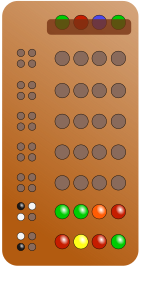অপসারক যুক্তিবিন্যাস
অপসারক যুক্তিবিন্যাস (ইংরেজি: Abductive reasoning), অপসারণ (Abduction[১]), অপসারক অনুমিতি (Abductive inference[১]) কিংবা পশ্চাৎসারণ (Retroduction[২]) বলতে এক ধরনের যৌক্তিক অনুমিতিকে বোঝায়, যা মার্কিন দার্শনিক চার্লস স্যান্ডার্স পার্স ১৯শ শতকের শেষ তৃতীয়াংশে সূত্রায়ন ও প্রস্তাব করেন। এই যুক্তিবিন্যাসটি কোনও পর্যবেক্ষণ বা পর্যবেক্ষণসমষ্টি থেকে শুরু হয় এবং ঐগুলি থেকে সবচেয়ে সরল ও সবচেয়ে সম্ভাব্য সিদ্ধান্তটিতে উপনীত হবার চেষ্টা করে। অবরোহী যুক্তিবিন্যাসের পরিবর্তে এই প্রক্রিয়াটিতে একটি আপাতগ্রাহ্য সিদ্ধান্তে উপনীত হওয়া যায়, তবে সন্দেহাতীতভাবে এটির সত্যতা বা সঠিকতা যাচাই করা সম্ভব হয় না। অপসারক যুক্তিবিন্যাসের ফলে উপনীত সিদ্ধান্তগুলিতে তাই অনিশ্চয়তা বা সন্দেহ অবশিষ্ট থেকে যায়, যে ব্যাপারটিকে "সেরা বিদ্যমান" কিংবা "সর্বোচ্চ সম্ভাব্য" জাতীয় পশ্চাদপসরণমূলক পরিভাষা দিয়ে প্রকাশ করা হয়। অন্য ভাষায় অপসারক যুক্তিবিন্যাস হল সেরা ব্যাখ্যার অনুমিতি,[৩] যদিও অপসারণ এবং সেরা ব্যাখ্যার অনুমিতি পরিভাষাগুলির সমস্ত ব্যবহার সবসময় সমতুল্য না-ও হতে পারে।[৪][৫]

১৯৯০-এর দশকে পরিগণনের (কম্পিউটিংয়ের) ক্ষমতা বৃদ্ধির সাথে সাথে আইন,[৬] কম্পিউটার বিজ্ঞান (পরিগণক বিজ্ঞান) ও কৃত্রিম বুদ্ধিমত্তা গবেষণা ক্ষেত্রগুলিতে[৭] অপসারণ বিষয়ে পুনরায় আগ্রহের সৃষ্টি হয়।[৮] সমস্যা নির্ণয়কারী বিশেষজ্ঞ ব্যবস্থাগুলিতে প্রায়শই অপসারক যুক্তিবিন্যাস ব্যবহার করা হয়।[৯]
তথ্যসূত্র
সম্পাদনা- ↑ ক খ For example: Josephson, John R.; Josephson, Susan G., সম্পাদকগণ (১৯৯৪)। Abductive Inference: Computation, Philosophy, Technology। Cambridge, UK; New York: Cambridge University Press। আইএসবিএন 978-0521434614। ওসিএলসি 28149683। ডিওআই:10.1017/CBO9780511530128।
- ↑ "Retroduction"। Commens – Digital Companion to C. S. Peirce। Mats Bergman, Sami Paavola & João Queiroz। ২০১৪-০৮-২৬ তারিখে মূল থেকে আর্কাইভ করা। সংগ্রহের তারিখ ২০১৪-০৮-২৪।
- ↑ Sober, Elliott (২০১৩)। Core Questions in Philosophy: A Text with Readings (6th সংস্করণ)। Boston: Pearson Education। পৃষ্ঠা 28। আইএসবিএন 9780205206698। ওসিএলসি 799024771।
I now move to abduction—inference to the best explanation.
- ↑ Campos, Daniel G. (জুন ২০১১)। "On the distinction between Peirce's abduction and Lipton's inference to the best explanation"। Synthese। 180 (3): 419–442। এসটুসিআইডি 791688। ডিওআই:10.1007/s11229-009-9709-3।
I argue against the tendency in the philosophy of science literature to link abduction to the inference to the best explanation (IBE), and in particular, to claim that Peircean abduction is a conceptual predecessor to IBE. [...] In particular, I claim that Peircean abduction is an in-depth account of the process of generating explanatory hypotheses, while IBE, at least in Peter Lipton's thorough treatment, is a more encompassing account of the processes both of generating and of evaluating scientific hypotheses. There is then a two-fold problem with the claim that abduction is IBE. On the one hand, it conflates abduction and induction, which are two distinct forms of logical inference, with two distinct aims, as shown by Charles S. Peirce; on the other hand it lacks a clear sense of the full scope of IBE as an account of scientific inference.
- ↑ Walton, Douglas (২০০১)। "Abductive, presumptive and plausible arguments"। Informal Logic। 21 (2): 141–169। ডিওআই:10.22329/il.v21i2.2241। সাইট সিয়ারX 10.1.1.127.1593 ।
Abductive inference has often been equated with inference to the best explanation. [...] The account of abductive inference and inference to the best explanation presented above has emphasized the common elements found in the analyses given by Peirce, Harman and the Josephsons. It is necessary to add that this brief account may be misleading in some respects, and that a closer and more detailed explication of the finer points of the three analyses could reveal important underlying philosophical differences. Inferences to the best explanation, as expounded by Harman and the Josephsons, can involve deductive and inductive processes of a kind that would be apparently be excluded by Peirce's account of abduction.
- ↑ See, e.g. Analysis of Evidence, 2d ed. by Terence Anderson (Cambridge University Press, 2005)
- ↑ For examples, see "Abductive Inference in Reasoning and Perception", John R. Josephson, Laboratory for Artificial Intelligence Research, Ohio State University, and Abduction, Reason, and Science. Processes of Discovery and Explanation by Lorenzo Magnani (Kluwer Academic/Plenum Publishers, New York, 2001).
- ↑
Flach, P. A.; Kakas, A. C., সম্পাদকগণ (২০০০)। Abduction and Induction: Essays on their Relation and Integration। Springer। পৃষ্ঠা xiii। সংগ্রহের তারিখ ৩১ অক্টোবর ২০১৬।
This book grew out of a series of workshops on this topic. [Budapest 1996; Nagoya 1997; Brighton 1998]
- ↑ Reggia, James A., et al. "Answer justification in diagnostic expert systems-Part I: Abductive inference and its justification." IEEE transactions on biomedical engineering 4 (1985): 263-267.